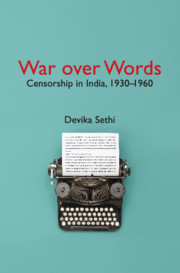Book contents
- Frontmatter
- Dedication
- Contents
- Acknowledgements
- List of Abbreviations
- Introduction
- Part I Guarding the State, Protecting the Public: Censorship Policies and Practices in the 1930s
- Part II Protests and Publicity: Banning Non-Indian Authors
- Part III Political or Military? Censorship in India during the Second World War
- Part IV The Censored Turn Censors: Freedom and Free Speech
- Conclusion
- Epilogue
- Bibliography
- Name Index
- General Index
Introduction
Published online by Cambridge University Press: 26 April 2019
- Frontmatter
- Dedication
- Contents
- Acknowledgements
- List of Abbreviations
- Introduction
- Part I Guarding the State, Protecting the Public: Censorship Policies and Practices in the 1930s
- Part II Protests and Publicity: Banning Non-Indian Authors
- Part III Political or Military? Censorship in India during the Second World War
- Part IV The Censored Turn Censors: Freedom and Free Speech
- Conclusion
- Epilogue
- Bibliography
- Name Index
- General Index
Summary
Debates over freedom of expression and censorship are all-pervasive in our world today. Even as changing technologies of communication have democratized the expression of opinion, and given a platform for all its conceivable shades, the fundamental issues and questions regarding regulation of expression remain unchanged. Most people would answer in the affirmative to the question ‘Is freedom of expression desirable?’ or ‘Is freedom of expression the hallmark of a democracy?’ Answers to the question ‘Should freedom of expression be restricted on any grounds?’ would probably draw less certain answers. ‘Should a book or film be banned if it causes violence and deaths due to demonstrations against it?’ would perhaps cause perplexity. There is also the question of intent. Does the government need to establish an author's intent to hurt community sentiment before banning her book? Or is intent irrelevant? What about ‘truth’ as a defence? If a statement made in a historian's study is verifiable but still causes offence, can that study still be banned? What does banning do, in any case? Does it remove the material from circulation, or does it increase public interest in it, or does the very process of seeking a ban publicize the material that is sought to be suppressed? Are people moved to action by what they read? Is there a direct connection between words and violence? These are some of the complex questions surrounding free speech. These issues are strewn in the historical record as well; historical reconstruction of free speech controversies and censorship has, therefore, much to tell us about our own times, and how things have come to be as they are.
Although the midnight of 14–15 August 1947 is the most famous in Indian history, it was another midnight—that of 31 December 1929 and 1 January 1930—that profoundly altered the very basis of the anti-colonial movement in India. In 1929 the British Viceroy, Lord Irwin, promised India Dominion status. The Indian National Congress (founded in 1885) sponsored the hoisting of a ‘national’ flag and the reading of an ‘Independence Pledge’ at Lahore on this midnight. This was followed, on 26 January 1930, by the declaration that henceforth complete independence—Purna Swaraj—was their aim.
- Type
- Chapter
- Information
- War over Words , pp. 1 - 20Publisher: Cambridge University PressPrint publication year: 2019



